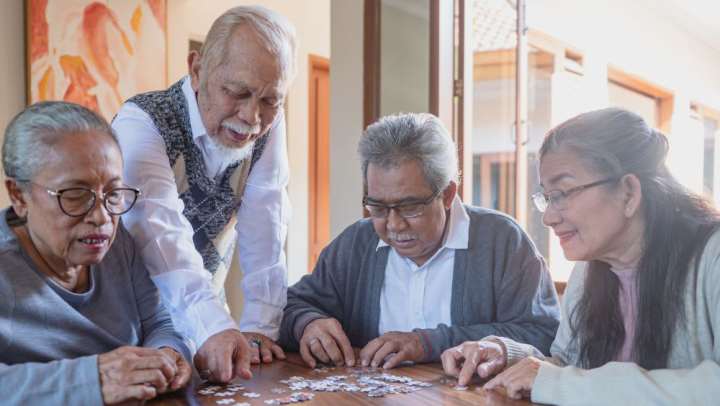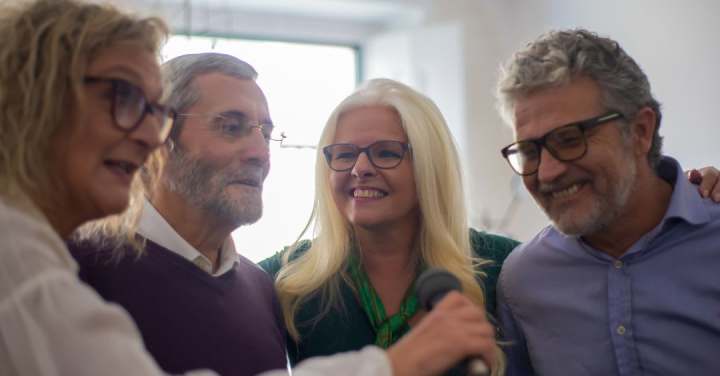Memory care in Oklahoma City provides specialized environments where residents with Alzheimer's and dementia can feel secure in smaller, more intimate settings. These communities understand what families face when memory loss enters the picture.
Your loved one deserves meaningful connections and you deserve support in maintaining those relationships.
You can learn to communicate effectively with someone experiencing memory loss. Real friendships remain possible, even when cognitive abilities change. Rather than focusing on what's been lost, we'll explore the fundamental principles that create meaningful relationships when memory fades. The right approach opens doors to genuine joy and understanding that you and your loved one will treasure.
Why Connection Matters in Memory Care
Social connection protects the brain in ways that might surprise you. While we often think of memory care as managing decline, meaningful relationships can slow that process. Your loved one's brain responds to social engagement like medicine—and the effects extend far beyond a few pleasant conversations.
Benefits of social interaction for memory loss
People who experience isolation face significantly higher risks of cognitive decline and dementia onset, while those who stay socially engaged enjoy measurable protection against these conditions. The brain benefits from social interaction through multiple pathways: building cognitive reserve, strengthening mental resilience and reducing chronic stress that damages brain tissue over time.
Even small increases in social interaction create meaningful change. Extending daily social contact from two to ten minutes improved the well-being of people with dementia in care settings. Ten minutes. When combined with personalized attention, this modest change led to noticeable improvements in residents' daily experiences.
How friendships improve emotional and cognitive health
Family relationships matter enormously, but friendships offer something unique. Friendships may provide distinct cognitive advantages compared to family connections. This difference stems from the voluntary nature of friendships—they require active choice and ongoing effort to maintain, which exercises different parts of the brain and emotional system.
For someone living with memory loss, these connections provide emotional anchoring that goes well beyond companionship. Friends help maintain identity and purpose when other aspects of life feel uncertain. They offer continuity—a bridge between who your loved one was and who they remain, even as memories shift and change.
Barriers to Connection and How to Overcome Them
Early signs often appear gradually. Your loved one might pause mid-sentence, searching for a word that seems just out of reach. They may repeat favorite phrases or use familiar words in unexpected ways. Conversations might drift off track as thoughts become harder to organize and the logical flow of ideas that once came easily now requires more effort.
Approaches that help vs. those that don't
|
What Works |
What Doesn't Help |
|
Simple, clear sentences |
Complex questions requiring memory recall |
|
Speaking slowly with patience for responses |
Correcting errors or arguing about facts |
|
Respectful eye contact |
Talking about them as if they're not present |
|
Appropriate gentle touch |
Condescending or childish tones |
Creating the right environment makes a real difference. Turn off background noise like television during conversations. Sit at their eye level to feel less intimidating. Most importantly, practice active listening—watch for non-verbal cues, give them time to respond and focus on validating their feelings rather than correcting details.
Pillars of Connection in Memory Care
The path to meaningful connection doesn't require perfect conversations or flawless interactions. Instead, five fundamental principles can help you build deeper relationships with your loved one, even when memory loss changes how they communicate and experience the world.
-
Emotional validation and empathy: Acknowledge their feelings, even if their perception differs from reality. Validate their emotions rather than correcting them.
-
Nonverbal communication and gentle touch: As words become difficult, rely on facial expressions, body language, and physical contact. Approach at eye level, maintain gentle eye contact, and use comforting touch.
-
Shared sensory experiences: Engage multiple senses (sight, sound, touch, smell, taste) to activate broader brain regions and unlock memories.
-
Reminiscence and familiar objects: Use photographs, music or cherished possessions to trigger distant memories and encourage conversation. These objects provide comfort and memory anchors.
-
Consistency and routine: Predictable daily routines provide security and maintain independence, creating positive neural connections.
Nurturing Your Bond Through Change
Your relationship with your loved one doesn't end when memory loss begins—it simply changes shape. The principles we've covered offer concrete ways to nurture that bond, even when words become harder to find and familiar routines shift.
Each visit, conversation and gentle touch matters more than you might realize. You're not just maintaining a relationship—you're providing an essential human connection that improves their quality of life. Start with one or two of the most natural approaches, then build from there. The love you share will guide the way forward.
If you'd like to explore specialized environments to support these connections, you can tour Iris Memory Care NW, Oklahoma City, by calling (405) 252-8200.
FAQs
Q1. How can I maintain a meaningful connection with my loved one in memory care?
Focus on emotional validation, nonverbal communication and shared sensory experiences. Use simple language, maintain eye contact and incorporate gentle touch when appropriate. Engage in activities that promote multiple senses and evoke positive memories.
Q2. What are the benefits of social interaction for individuals with memory loss?
Social interaction can slow cognitive decline, reduce stress, improve sleep patterns, enhance mood and provide mental stimulation. Socially active older adults experience significantly less cognitive decline than less socially engaged ones.
Q3. How can I overcome communication barriers with someone who has dementia?
Use clear, simple sentences and allow extra time for responses. Pay attention to non-verbal cues and body language. Minimize distractions during conversations and create a supportive environment. Remember that your approach and patience are more important than finding perfect words.


